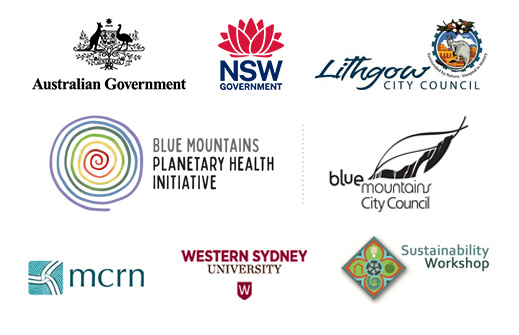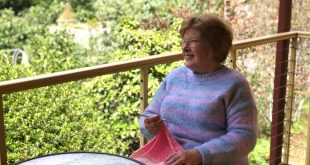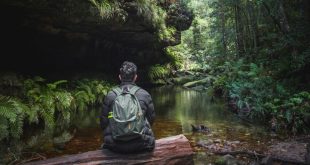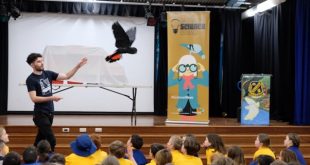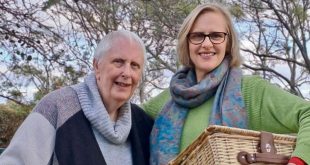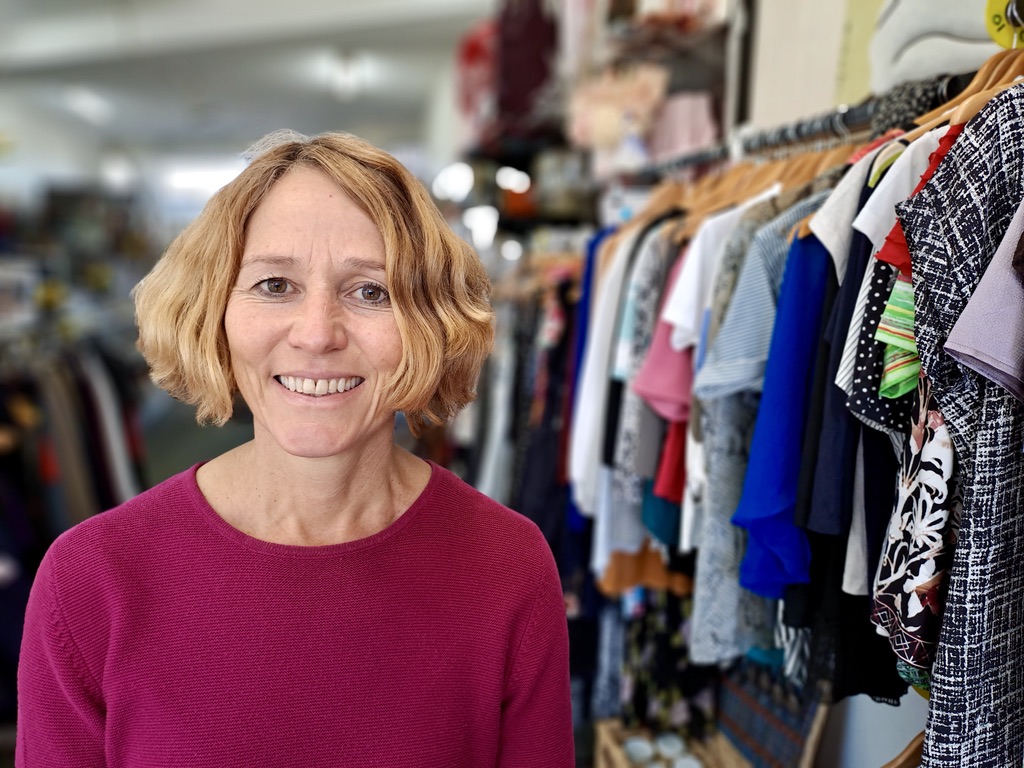
Kirsten Velthuis is working with her Rotary Club to challenge the status quo around waste (Julie Nance)
By Julie Nance
From running the Rotary Recycles Op Shop, to replacing disposable coffee cups with crockery at the Glenbrook Rotary Markets (and lots more!), volunteers in the Lower Blue Mountains Rotary Club are taking up the challenge of Rotary’s newest area of focus: ‘Supporting the Environment’. Julie Nance interviews the Club’s Environmental Working Group chair Kirsten Velthuis.
When you think of environmental impact, flipping sausages at a community market is probably not the first thing that comes to mind.
For Kirsten Velthuis, this humble beginning as a member of the Lower Blue Mountains Rotary Club has led to a raft of steps to improve the Club’s sustainability footprint.
By day, Kirsten is the Senior Environmental Advisor at Australian Rail Track Corporation. She is working on the Environmental Impact Statement for Inland Rail, a 1700 km freight rail line being developed between Melbourne and Brisbane.
Kirsten says that gaining state and federal environmental approvals takes time but with her volunteer role at Rotary, “it’s the small things where I feel I’m getting a sense of achievement”.
This includes setting up an Environment Working Group, introducing a sustainability tracker for the Rotary Recycles Op Shop, and working towards zero waste at Glenbrook Rotary Markets.
It’s certainly not a bad start considering Kirsten and her husband moved to Glenbrook in 2020.
“I thought joining a Rotary club would be a nice way to meet people and start some long-term volunteering,” says Kirsten, who is the Club’s environmental representative, the Environment Working Group chair and one of the volunteer managers of the Club’s Op Shop. She also organises environmental experts to speak at Club meetings.
Kirsten recognises that environmental issues can be an “overwhelming, sometimes scary and negative topic in terms of climate change and things like that”.
“We say ‘think global, act local’. We’re starting local as it’s the small things you do in your own community that have impact.”
Kirsten set up the Environment Working Group last year, attracting 12 of the 60 Club members to participate. It’s a diverse group of workers and retirees including a cardiologist, nurse, health director, accountant and wedding celebrant.
The main reasons they wanted to take part was to look after the planet for children and grandchildren and to attract younger members to Rotary.
The Lower Blue Mountains Rotary Club is part of a global network that contributes to local, national and international projects. ‘Supporting the environment’ was added as a seventh International Rotary focus area in recent years, building on:
- peace and conflict resolution
- water and sanitation
- maternal and child health
- disease prevention and treatment
- basic education and literacy
- economic and community development.
This year the Working Group is striving for a gold district Rotary environmental award, the Club having previously already won bronze and silver. This includes recognition for their long-standing Clean Up Australia Day contributions and the impactful work of the Rotary Recycles Op Shop that opened in mid-2019.
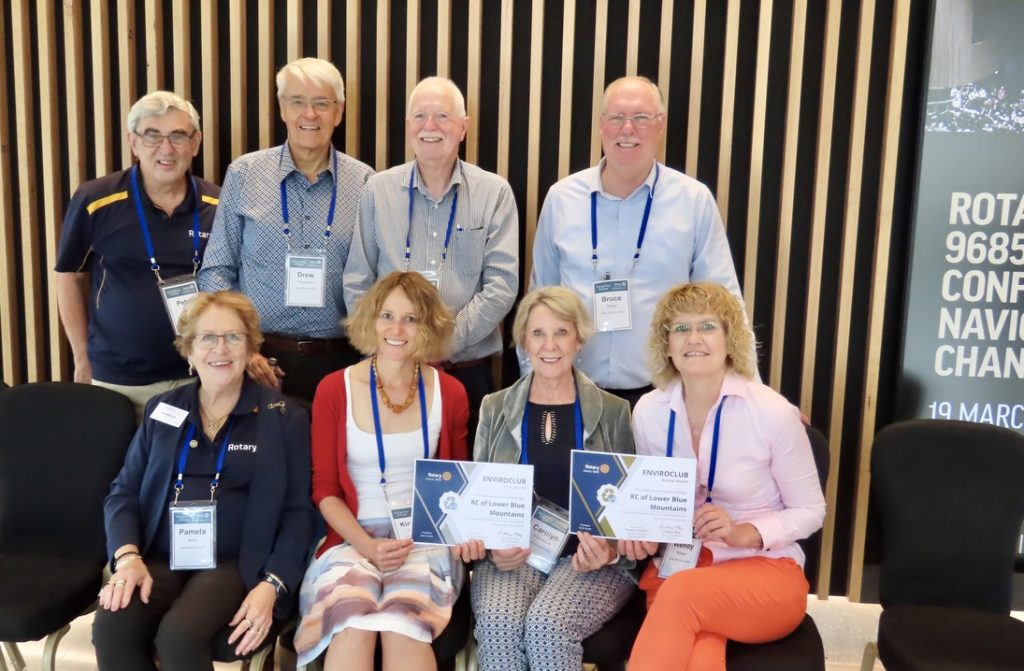
Environment Working Group members with the Bronze and Silver EnviroClub Awards (photo supplied) Top L-R: Peter Agar, Drew Fitzpatrick, Ian Chappel, Bruce BaileyBottom L-R: Pamela Noal, Kirsten Velthuis, Carolyn Fitzpatrick, Wendy Bowen
Located on the Great Western Highway, near the corner of View Street, Blaxland, the Op Shop is a social enterprise with its own Board and a close-knit group of Rotary and community volunteers.
When I visited the Op Shop it was buzzing with customers browsing an eclectic array of pre-loved clothes, knick-knacks, yarn, fabric, toys and electrical goods, all tested and tagged by a local, volunteer electrician.
Kirsten introduced a sustainability tracker for the shop halfway through last year to find out “our sustainability footprint by tracking it, reviewing it and seeing how we can improve it”. By the end of this financial year there will be a year’s worth of data to analyse – the all-important ‘baseline’.
This includes electricity use and the ‘fuel economy’, such as volunteers’ kilometres travelled by car between their homes and the shop, and to and from the shop’s Attunga Rd storage area. The storage area is run by Bruce Bailey, Club President and waste water treatment plant manager.
Water use is also being tracked, which Kirsten says isn’t a lot but “we do have copious amounts of cups of tea”.
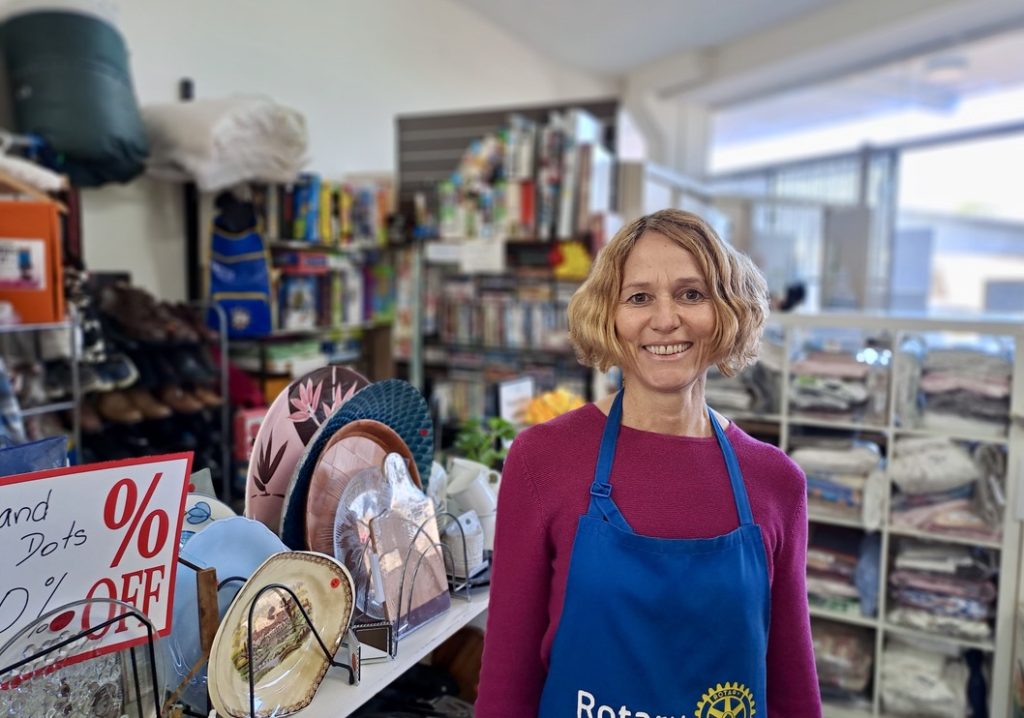
Kirsten enjoys the buzzing atmosphere of the shop (Julie Nance)
“One of the other things I wanted to capture as a positive thing is how much waste we are taking out of the waste stream by reselling goods in the shop. This is all about starting to get us thinking, to challenge the status quo.
Kirsten Velthuis
“For instance, volunteers travelling to and from the shop: is there any way they could share driving or for some, catch a train? I cycle to the shop sometimes depending on the weather. It’s second nature to me because I’m from Holland.
“When you start focusing on it that’s when you think ‘can we do this in a different way?’ If you’re not thinking about it, then it’s just business as usual.”
Kirsten is also measuring the contents of large containers of goods being sold in the shop. I was interested to learn that items that can’t fit into the shop or aren’t quite suitable, are donated to more than 10 different charities.
For example, excess blankets and sleeping bags are sent to Blanket Patrol which distributes essentials to people in need, including the homeless and disadvantaged families.
Towels that can’t be sold in the shop are given to Blaxland Vet to help care for injured wildlife that are brought into the practice.
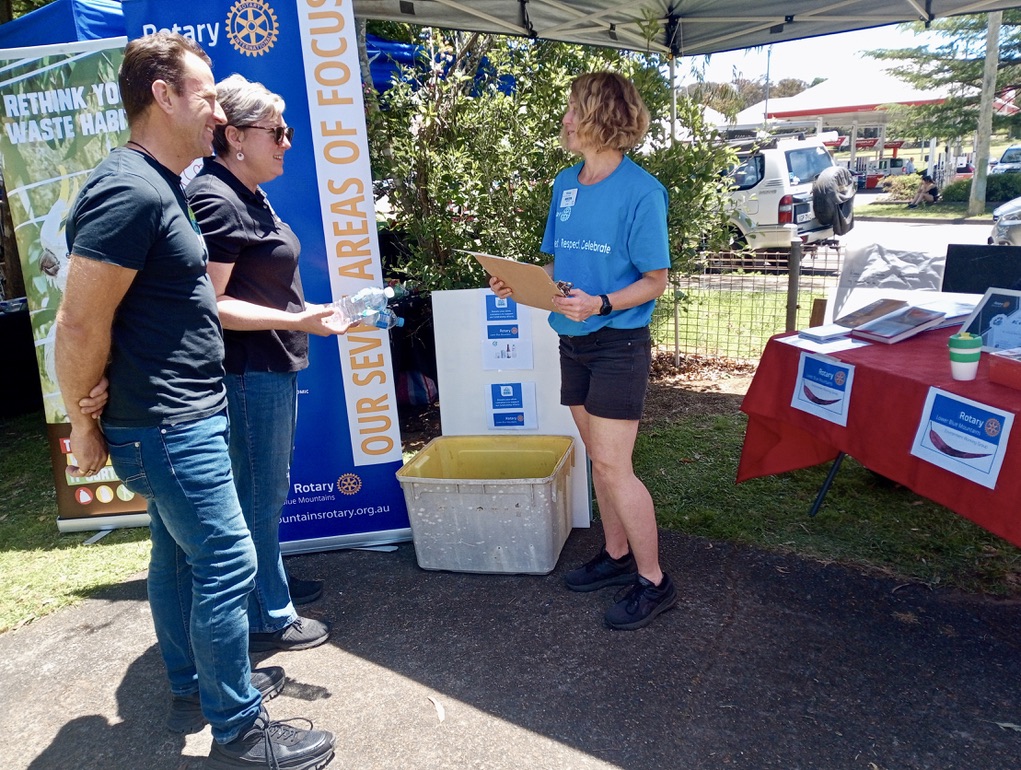
Kirsten at the Glenbrook Markets, promoting the Club’s environmental initiatives (photo supplied)
Kirsten is equally passionate about striving for zero waste at Glenbrook Rotary Markets, held on the first and third Saturday of each month.
She says: “Up until February this year, all the market waste went into a giant skip. It was clear we needed to lift our game.”
Six recycling bins have now been introduced with clear labelling, with red bins marked as ‘landfill’. The Rotary stall offers crockery coffee mugs from the Op Shop instead of disposable cups.
“People can either purchase the mug or bring it back after having their tea or coffee,” Kirsten says.
“One of our Club members is an avid composter so he gets all the egg shells from the eggs being cooked and takes them home to feed his chickens.”
Single-use cable ties that were previously used to tie up banners have been replaced with reusable ones. “Little things like that make a difference over time,” Kirsten says.
Kirsten has set up her Rotary Club to be a donation partner through ‘Return and Earn’. Volunteers extract cans and bottles from the recycling bins at the end of each market. Anyone with a Return and Earn app can select the Club to receive their donation. Funds currently go to Mountains Youth Services Team (MYST).
“A goal is to partner up with local hospitality venues for their bottles and cans and fundraise that way,” Kirsten says.
“Another step will be managing green waste and of course, earlier this year the NSW Government banned single use plastic cutlery, plates, spoons and the like. A long term, aspirational aim is to come up with an agreement for stall holders to have zero waste in their stalls, for example by having compostable cups.”
Kirsten’s energy is infectious. I’m guessing that helps her juggle full-time paid work and volunteering.
“I see myself as a facilitator – helping to drive things,” says Kirsten.
“I love seeing people come up with their own great initiatives and ideas. We’re taking little steps to focus our attention and if nothing else, we’ll be getting the message out about what our Club is doing to support the community.”
This story has been produced as part of a Bioregional Collaboration for Planetary Health and is supported by the Disaster Risk Reduction Fund (DRRF). The DRRF is jointly funded by the Australian and New South Wales governments.
